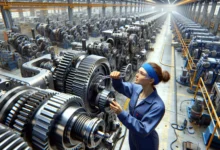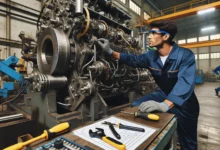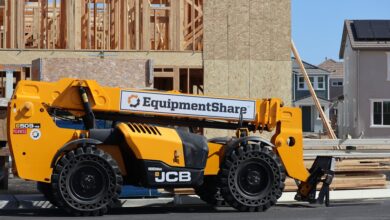How to Choose the Best Industrial Machinery Suppliers: Tips, Top Companies, and Key Trends
Advertisement
Finding the right industrial machinery supplier can make or break a business. I know how overwhelming it feels to sift through endless options, each promising the best equipment and service. The right partner doesn’t just deliver machines—they bring expertise, reliability and long-term value.
I’ve learned that choosing wisely means more than just comparing prices. It’s about building relationships with suppliers who understand my industry’s needs and help me stay ahead of the competition. Whether I’m upgrading my production line or starting a new project, a trusted supplier is my secret weapon for success.
Understanding Industrial Machinery Suppliers
Identifying qualified industrial machinery suppliers starts with industry research. I always look for suppliers that specialize in my sector, whether in automotive, food processing, or pharmaceuticals, as each industry has unique machinery and compliance needs.
Reviewing product portfolios makes a big difference. I examine what types of machinery a supplier stocks—such as CNC machines, conveyors, or packaging systems—to be sure they match my technical requirements.
Evaluating supplier credentials helps me gauge reliability. I verify certifications like ISO 9001 and check how long the supplier has operated. References from established clients or industry associations increase my confidence.
Assessing support services ensures a good long-term partnership. I look for suppliers that offer installation, maintenance, spare parts, and technical training. This kind of support keeps my operations running smoothly and limits costly downtime.
Comparing pricing structures provides clarity on value. I request full quotes, including after-sales services and warranties, to avoid hidden costs and ensure budget accuracy.
Communicating expectations keeps everything on track. I discuss delivery timelines, custom solutions, and service level agreements before signing contracts to guarantee there are no surprises down the line.
Choosing Reliable Industrial Machinery Suppliers
I always make supplier reliability a top priority to keep my business running smoothly and avoid unnecessary risks.
Evaluating Supplier Reputation
I check supplier reputation by reviewing client testimonials and independent ratings on industry platforms like Thomasnet and Alibaba. I look for suppliers with consistent positive feedback on service, delivery, and technical support over several years. I also ask for references from companies in my industry, ensuring the supplier is trusted with similar machinery needs. A proven track record reassures me that the partnership will be dependable.
Assessing Product Quality and Range
I inspect product quality by requesting certifications, such as ISO 9001, and analyzing sample machinery when available. I prioritize suppliers with a wide range of machines tailored for my sector, like CNC lathes for precision engineering or filling lines for food manufacturing. I verify that their machinery complies with local safety regulations and offers the latest technology for efficient production. A broad and up-to-date product portfolio shows me that the supplier is committed to evolving industry standards.
Comparing Pricing and Value
I compare pricing by requesting detailed quotes that cover not just initial costs but also after-sales support, maintenance packages, and delivery terms. I analyze total cost of ownership, including factors like energy consumption and spare parts availability. I look for transparent pricing models that allow me to see where my investment goes. Getting the best value means balancing affordable upfront prices with long-term savings and reliable service.
Exploring Types of Industrial Machinery Suppliers
When I source industrial machinery, understanding the different supplier types helps me match my business needs with the right partner. Here are the primary categories I consider:
Specialized Machinery Suppliers
Specialized machinery suppliers focus on specific industry sectors like packaging, food processing, or pharmaceuticals, supplying equipment tailored to those niches. I often turn to these suppliers for advanced or custom solutions—think CNC machine builders or pharmaceutical filling system providers—since their deep industry knowledge ensures their products meet strict compliance and performance standards. These suppliers usually offer technical expertise and product customization options that generic suppliers can’t match.
General Equipment Distributors
General equipment distributors stock a wide range of industrial machinery from many manufacturers, covering everything from forklift trucks to industrial compressors and assembly line components. I rely on them when I need standard equipment quickly or want to compare brands under one roof. These distributors simplify the purchasing process by offering bundled solutions, flexible shipping, and consolidated after-sales support for multiple machine types.
Online Industrial Marketplaces
Online industrial marketplaces like Alibaba, Thomasnet, and Made-in-China.com aggregate thousands of machinery suppliers, giving me instant access to global options. These platforms let me research, compare, and review supplier ratings and certifications before reaching out. Online marketplaces streamline sourcing, especially for hard-to-find machines or when I want to obtain competitive bids quickly. They often include buyer protection features and facilitate easier cross-border transactions.
Highlighting Top Industrial Machinery Suppliers Worldwide
I’ve gathered some of the world’s top industrial machinery suppliers, selected for their reliability, robust product range, and industry leadership. These suppliers set market standards, offering solutions for businesses seeking advanced technology and dependable support.
Leading Global Suppliers
- Siemens AG
Siemens leads industrial automation, power generation, and digitalization solutions. Its broad portfolio covers electronics, robotics, and smart manufacturing equipment trusted in more than 190 countries.
- Caterpillar Inc.
Caterpillar is well-known for durable construction and mining machinery, with an extensive dealer network and after-sales support. Its global footprint ensures reliable equipment and services for critical industries.
- ABB Group
ABB excels at robotics, control systems, and electrical machinery, supporting manufacturing and utilities sectors across six continents. Its innovations drive efficiency, smart factories, and sustainability goals worldwide.
- Hitachi Construction Machinery
Hitachi provides advanced construction, mining, and hydraulic equipment, focusing on quality and technological integration. Its presence spans Asia, Europe, and the Americas.
- Komatsu Ltd.
Komatsu manufactures heavy machinery for construction, mining, and forestry, offering robust equipment and telematics. Its global loyalty stems from solid reliability and responsive service.
| Supplier | Region Coverage | Key Industries | Unique Value |
|---|---|---|---|
| Siemens AG | Global | Automation, Digital | Digitalization, Smart Solutions |
| Caterpillar Inc. | Global | Construction, Mining | Durability, Dealer Network |
| ABB Group | Global | Robotics, Utilities | Sustainability Leadership |
| Hitachi | Asia, Global | Construction, Mining | Advanced Integration |
| Komatsu | Global | Forestry, Mining | Telematics, Reliability |
Notable Regional and Local Suppliers
- JTEKT Corporation (Japan)
JTEKT specializes in motion control and machine tools, supplying top automobile and industrial manufacturers throughout Asia.
- Doosan Infracore (South Korea)
Doosan delivers innovative heavy equipment and industrial engines to power projects in Southeast Asia and the Middle East.
- Atlas Copco (Sweden)
Atlas Copco is a leader in Europe, offering compressors, assembly tools, and vacuum solutions for automotive and electronics sectors.
- Wirtgen Group (Germany)
Wirtgen serves Europe and the Americas, focusing on road construction equipment and environmentally friendly technologies.
- Hurco Companies (USA)
Hurco supplies CNC machining centers and automation equipment, supporting precision manufacturers in North America.
These regional and local suppliers combine deep industry expertise with localized service, making them ideal for companies needing tailored support and faster logistics. I rely on their specialized offerings to streamline operations according to regional requirements.
Considering After-Sales Support and Services
After-sales support makes a huge difference in machinery performance and long-term value. I always prioritize suppliers offering strong support to minimize downtime and protect my investment.
Warranty and Maintenance Plans
Warranty terms reveal how much faith a supplier puts in their products. I compare warranty durations, what components are covered, and response times for warranty claims. Leading industrial machinery suppliers, such as Caterpillar and Komatsu, provide comprehensive warranties and optional extended coverage. Maintenance plans are just as important—I look for preventive maintenance packages, scheduled inspections, and fast access to replacement parts. Suppliers with in-house service teams usually resolve issues faster than suppliers relying on third-party providers.
Technical Support and Training
Technical support should be accessible and knowledgeable. I prefer suppliers with 24/7 hotlines, local service centers, and multilingual support, like Siemens AG and ABB Group. Training is non-negotiable when investing in advanced equipment; proper staff training reduces errors and boosts productivity. I choose suppliers offering on-site or remote operator training, maintenance courses, and equipment manuals. Ongoing support, such as software updates and troubleshooting assistance, ensures I get the full benefit from my machinery investment.
Navigating Trends in Industrial Machinery Supply
Industrial machinery supply chains are evolving fast, shaped by digital advances and sustainability demands. I see two main trends redefining how I evaluate and work with suppliers today.
Embracing Digital Transformation
Digital technologies now drive efficiency and connectivity across the industrial machinery sector. Suppliers are adopting smart tools like IoT sensors, AI-driven predictive maintenance, and cloud-based asset management. I look for suppliers using real-time data monitoring to minimize downtime and quickly flag issues. Companies such as Siemens AG and ABB Group use automated platforms for inventory tracking and remote diagnostics, saving me time and reducing costly disruptions. Suppliers offering digital catalogs, online configurators, and seamless ERP integration let me streamline procurement and access technical documents instantly. I prioritize partners who invest in cybersecurity and data transparency, ensuring my production lines stay protected and optimized.
Implementing Sustainable Solutions
Sustainability has become pivotal in my supplier selection process. Leading machinery suppliers now design equipment with low emissions, high energy efficiency, and recyclable parts. I favor partners with clear environmental policies, like Komatsu Ltd. and Atlas Copco, who commit to carbon neutrality and eco-friendly manufacturing. Many suppliers offer electric or hybrid machinery options, reducing my carbon footprint while lowering operational costs. I check for certifications such as ISO 14001 to verify sustainability claims and expect transparent lifecycle assessments for machinery. Suppliers that incorporate circular economy practices—like refurbishing and reusing components—help me align my operations with global green standards.
Conclusion
Choosing the right industrial machinery supplier shapes not just your operations but your long-term growth. I always look for partners who combine technical expertise with reliable support and a commitment to innovation. By prioritizing quality, transparency, and sustainability, I know I’m building a foundation for efficiency and resilience in my business. The right supplier isn’t just a vendor—they’re a key ally in staying competitive in an ever-evolving industry.
Frequently Asked Questions
Why is it important to choose the right industrial machinery supplier?
Selecting the right supplier ensures you get reliable, high-quality equipment and expert support. A good supplier helps your business stay competitive, reduce downtime, and adapt to industry-specific needs, leading to long-term business success.
What factors should I consider when evaluating industrial machinery suppliers?
Look at industry specialization, product portfolio, supplier credentials (such as ISO certifications), operational history, and the quality of after-sales services like maintenance and training to ensure a strong partnership.
How can I check a supplier’s reliability and reputation?
Research online platforms like Thomasnet and Alibaba for reviews and ratings. Ask for client testimonials and references from industry peers to verify the supplier’s track record and reliability.
What are the main types of industrial machinery suppliers?
There are specialized machinery suppliers (focused on specific industries), general equipment distributors (offering a broad range), and online marketplaces (aggregating multiple suppliers for easy comparison and sourcing).
Why is after-sales support important when selecting a supplier?
Strong after-sales support, like installation, maintenance, and technical training, minimizes costly downtime and protects your investment, ensuring your machinery operates efficiently for the long term.
How should I compare pricing between different suppliers?
Request detailed quotes that include the cost of equipment, after-sales support, and maintenance. Consider the total cost of ownership, not just the initial price, to determine the best value for your business.
What should I look for in supplier certifications?
Prioritize suppliers with recognized certifications like ISO 9001, which demonstrate commitment to quality standards, compliance, and continuous improvement in their operations and products.
How do digital technologies impact industrial machinery suppliers?
Modern suppliers often use IoT, real-time data monitoring, and AI-driven maintenance to enhance efficiency. These digital tools help with predictive maintenance, better equipment management, and streamlined procurement.
Why are sustainability and environmental standards important in supplier selection?
Choosing suppliers with eco-friendly equipment and sustainable practices helps your business comply with global green standards, reduce environmental impact, and meet industry-specific regulations.
Who are some of the world’s top industrial machinery suppliers?
Leading names include Siemens AG, Caterpillar Inc., ABB Group, Hitachi Construction Machinery, and Komatsu Ltd. Regional options like JTEKT Corporation, Doosan Infracore, and Atlas Copco also offer strong local support.









